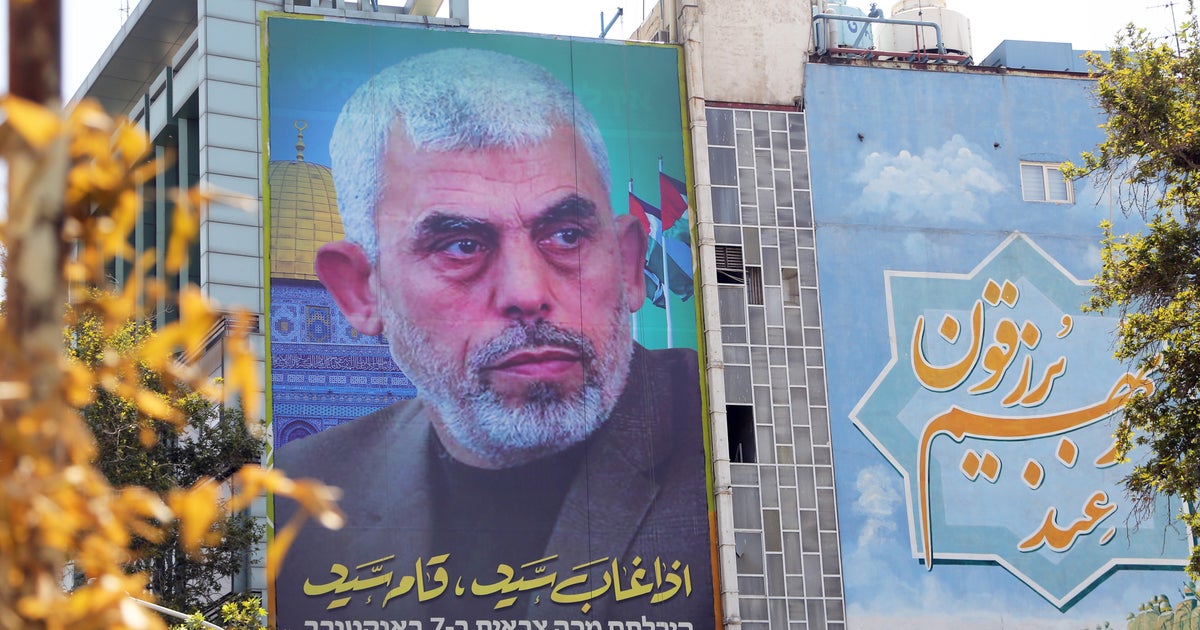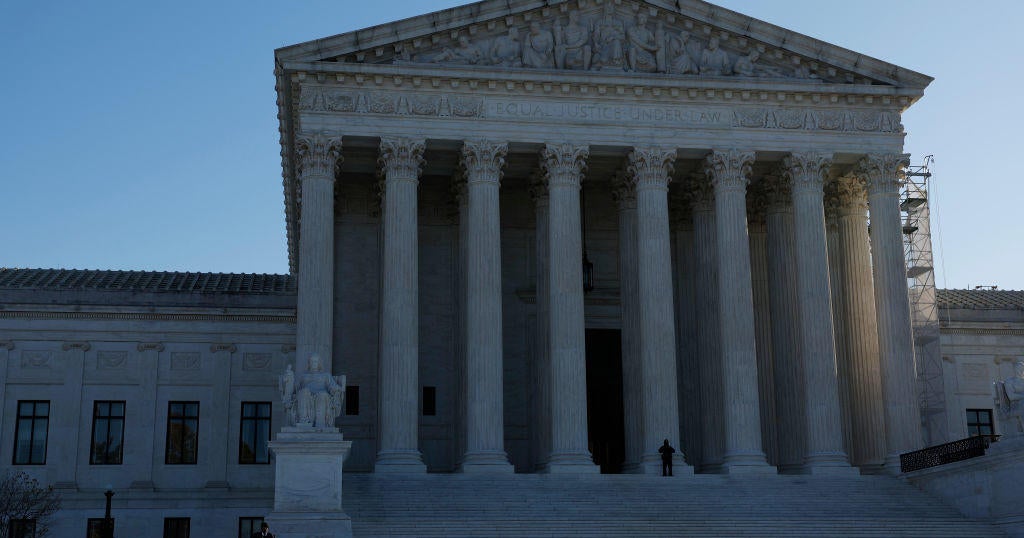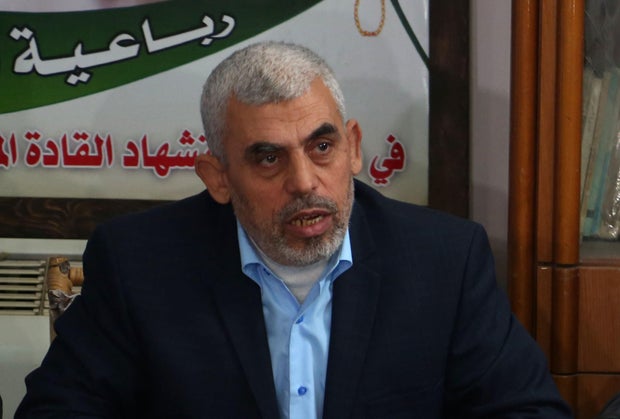CBS News
Israel says Yahya Sinwar, Hamas’ top leader in Gaza, killed in major blow to militant group

Israel’s Foreign Minister Israel Katz said Thursday that Hamas’ top leader and long-time commander in the Gaza Strip, Yahya Sinwar, was killed by troops during an operation in the decimated Palestinian territory.
In a message the Israeli government said was shared with dozens of other foreign ministers around the world, Katz said Sinwar, “who is responsible for the massacre and atrocities of October 7, was killed today by IDF soldiers.”
“This is a great military and moral achievement for Israel and victory for the free world in everything against the evil axis of extreme Islam led by Iran,” said Katz in the statement.
U.S. Rep. Mike Turner, who chairs the U.S. House of Representatives Permanent Select Committee on Intelligence said in a statement Thursday that “justice has been served to Hamas leader Yahya Sinwar,” adding that it was his hope the killing would “result in further progress toward the release of all hostages still held in Gaza, as well as to a ceasefire for Palestinians who have suffered under Hamas’ grip for far too long.”
A photo circulating on social media showed a man resembling the Hamas commander laying dead on a pile of rubble with a gaping head wound, but CBS News could not immediately verify the image. Sinwar had been one of the most wanted figures on Israel’s target list since Hamas launched its Oct. 7, 2023 cross-border terror attack, killing some 1,200 people and taking 251 others hostage.
“In the building where the terrorists were eliminated, there were no signs of the presence of hostages in the area,” the IDF said earlier Thursday.
Majdi Fathi/NurPhoto/Getty
Who was Yahya Sinwar
Sinwar, 61, was accused by Israel of orchestrating the Oct. 7 terrorist attack. He had remained in hiding in Gaza since that massacre was carried out.
He was named as the overall leader of Hamas in August, following the assassination of its former political chief Ismail Haniyeh during a visit to Iran. Before that he had led the group as its top commander in Gaza since 2017. He was considered a ruthless militant commander with close ties to Hamas’ biggest benefactor, Iran.
According to CBS News’ partner network BBC News, Sinwar was born in Khan Younis, in the southern Gaza Strip. His parents had lived in Ashkelon, which is now southern Israel, but they were among the hundreds of thousands of Palestinians displaced in the war that followed Israel’s founding in 1948.
Fatemeh Bahrami/Anadolu/Getty
Speaking during a 2021 news conference in Gaza, after a previous 10-day round of violence between Hamas and Israel, Sinwar told international journalists “the best gift the occupation leaders [Israel] can give me is assassinating me, because since childhood, I was raised in a way that taught me to sacrifice my life for this country.”
“We are not lovers of killing and death, but we are a people who need our rights given back to us,” he said. “If this is secured through popular, nonviolent resistance and international diplomacy then that is preferable, but if we are forced to use the most dangerous means, then we are ready, and our people we will not hesitate to use any means whatsoever to earn their rights.”
Israel’s steady elimination of Hamas leaders
The IDF has killed dozens of commanders and hundreds of fighters belonging to Hamas, long designated a terrorist group by the U.S., Israel and many other countries, since Israel launched its blistering war in Gaza in immediate retaliation for Oct. 7 attack. Prime Minister Benjamin Netanyahu has stressed since the beginning of the war that no senior Hamas figure would escape — and there was none more senior in Gaza than Sinwar.
Haniyeh, who spent decades living in exile in Qatar, was assassinated in Iran’s capital in late July after attending the inauguration of that country’s new president. Israel has not publicly claimed responsibility for the brazen assassination in Tehran, but U.S. officials told CBS News at the time that it was an Israeli strike.
Mohammed Deif, the head of Hamas’ military wing the al-Qassam Brigades, was killed in an airstrike in Gaza in July, according to the IDF.
“There is only one place for Yahya Sinwar, and it is beside Mohammed Deif and the rest of the October 7th terrorists,” IDF spokesman Daniel Hagari said in an interview over the summer. “That is the only place we’re preparing and intending for him.”
Israel’s top coordinator for hostages and the missing told CBS News’ Elizabeth Palmer in September that the Israeli government was prepared to offer Sinwar and his family safe passage out of Gaza if Hamas agreed to relinquish control of Gaza and allow the return of the remaining 101 hostages.
“It would be the end of the war, as [the hostages] will be recovered,” Israeli negotiator Gal Hirsch told CBS News at the time. Sinwar never issued a reply to the Israeli proposal.
Israeli hostage families react
Even before his death was confirmed by the IDF, the Israeli Hostages Families Forum said in a statement that his killing was an achievement, but that only the return of their loved ones could be considered a victory.
“The Hostages Families Forum commends the security forces for eliminating Sinwar, who masterminded the greatest massacre our country has ever faced, responsible for the murder of thousands and the abduction of hundreds,” the group said. “However, we express deep concern for the fate of the 101 men, women, elderly and children still held captive by Hamas in Gaza. We call on the Israeli government, world leaders, and mediating countries to leverage the military achievement into a diplomatic one by pursuing an immediate agreement for the release of all 101 hostages: the living for rehabilitation and the murdered for proper burial.”
Of the 101 hostages still held in Gaza, Israeli intelligence suggests 64 are still alive.
Sinwar’s killing was announced hours after more than a dozen Palestinians, including children, were killed in an Israeli airstrike on a school in Jabalia, in the northern Gaza Strip, that was sheltering displaced people, according to the health ministry in the Hamas-run Palestinian territory.
contributed to this report.
CBS News
What to know about the charges in UnitedHealthcare CEO’s killing

Watch CBS News
Be the first to know
Get browser notifications for breaking news, live events, and exclusive reporting.
CBS News
Prominent pro-Putin ballet star Sergei Polunin says he’s leaving Russia

Moscow — Former Royal Ballet star Sergei Polunin, famous for his tattoos of Russian President Vladimir Putin, on Wednesday announced that he plans to leave Russia. The Ukrainian-Russian dancer was one of the most prominent stars who backed Russia’s unilateral 2014 annexation of Crimea and its military assault on Ukraine. He was rewarded with prestigious state posts.
In a rambling, misspelled message on his Instagram account, Polunin wrote: “My time in Russia ran out a long time ago, it seems at this moment that I have fulfilled my mission here.”
The post first appeared Sunday on his little-read Telegram account.
Ian Gavan/Getty
Polunin, 35, did not give a specific reason for leaving but said that “a time comes when the soul feels it is not where it should be.”
He said he was leaving with his family — his wife Yelena and three children — but “where we will go is not clear so far.”
In the summer, the dancer complained of a lack of security and said he was being followed.
Polunin, who was born in Ukraine, backed Putin’s 2014 annexation of Crimea — a prelude to the ongoing, full-scale invasion of Ukraine that Putin launched in February 2022.
The dancer was granted Russian citizenship in 2019. He was appointed acting head of a dance academy in occupied Crimea’s biggest city, Sevastopol, and director of the city’s opera and ballet theatre, for which a large new building is under construction.
Just last year he was decorated by Putin for his role in popularizing dance. But in August he was replaced as head of the dance academy by former Bolshoi prima Maria Alexandrova, and a week ago, Russia’s arts minister Olga Lyubimova announced his theater director job would go to singer Ildar Abdrazakov.
This came after on December 9 Polunin published a social media post saying he was “very sorry for people” living in the heavily bombarded village near Ukraine’s city of Kherson, where his family originates from, and that “the worst deal would be better than war.”
Ian Gavan/Getty
Aged 13, Polunin won a scholarship to train at the Royal Ballet School in London and became its youngest ever principal dancer.
With his tattoos — including a large depiction of Putin’s face emblazoned prominently on his chest — and his rebellious attitude, he became known as the “bad boy of ballet” and caused a sensation by resigning from the Royal Ballet at the height of his fame in 2012.
Later he made a 2015 hit video to Irish musician Hozier’s song “Take Me to Church” and was the star of a 2016 documentary called “Dancer.”
He moved to perform at Moscow’s Stanislavsky Musical Theatre’s ballet before launching a solo career, starring in dance performances in roles including the mystic Grigory Rasputin.
In 2019 he posed for AFP with a large tattoo of Putin on his chest which he later supplemented with two Putin faces on either shoulder. He also has a large Ukrainian trident on his right hand.
This year he took part in Putin’s campaign for reelection as a celebrity backer.
CBS News
Supreme Court takes up South Carolina’s effort to defund Planned Parenthood

Washington — The Supreme Court on Wednesday agreed to consider South Carolina health department’s effort to cut off funding from Planned Parenthood because it performs abortions, wading into another dispute over access to the procedure in the wake of its reversal of Roe v. Wade.
The case, known as Kerr v. Edwards, stems from the state’s decision in 2018 to end Planned Parenthood South Atlantic’s participation in its Medicaid program. Gov. Henry McMaster, a Republican, directed the South Carolina Department of Health and Human Services to deem abortion clinics unqualified to provide family planning services and end their Medicaid agreements.
Planned Parenthood operates two facilities in the state, one in Charleston and the other in Columbia, and provides hundreds of Medicaid patients with services like physicals, cancer and other health screenings, pregnancy testing and contraception. Federal law prohibits Medicaid from paying for abortions except in cases of rape or incest, or to save the life of the mother.
Planned Parenthood and one of its patients, Julie Edwards, sued the state, arguing that cutting off its funding violated a provision of the Medicaid Act that gives beneficiaries the right to choose their provider.
A federal district court blocked South Carolina from ending Planned Parenthood’s participation in its Medicaid program, and a U.S. appeals court upheld that decision, finding that Edwards could sue the state to enforce the Medicaid Act’s free-choice-of-provider requirement.
The legal battle has already been before the Supreme Court in the past, with the high court last year ordering additional proceedings after deciding in a separate case that nursing home residents could sue their state-owned health care facility over alleged violations of civil rights.
After reconsidering its earlier decision, the three-judge appeals court panel ruled unanimously in March that Edwards’ lawsuit against the state could go forward and said South Carolina couldn’t strip Planned Parenthood of state Medicaid funds.
“This case is, and always has been, about whether Congress conferred an individually enforceable right for Medicaid beneficiaries to freely choose their healthcare provider. Preserving access to Planned Parenthood and other providers means preserving an affordable choice and quality care for an untold number of mothers and infants in South Carolina,” Judge Harvie Wilkinson wrote for the 4th Circuit panel.
South Carolina officials asked the Supreme Court to review that decision, marking the third time the case has been before the justices. The justices agreed to take up the question of whether “the Medicaid Act’s any-qualified provider provision unambiguously confers a private right upon a Medicaid beneficiary to choose a specific provider.”
South Carolina is among the more than two dozen that have passed laws restricting access to abortion in the wake of the Supreme Court’s June 2022 decision reversing Roe v. Wade. In South Carolina, abortion is outlawed after six weeks of pregnancy with some exceptions.
Several states have also enacted laws blocking Planned Parenthood from receiving Medicaid funding, including Arkansas, Missouri, Mississippi and Texas.










